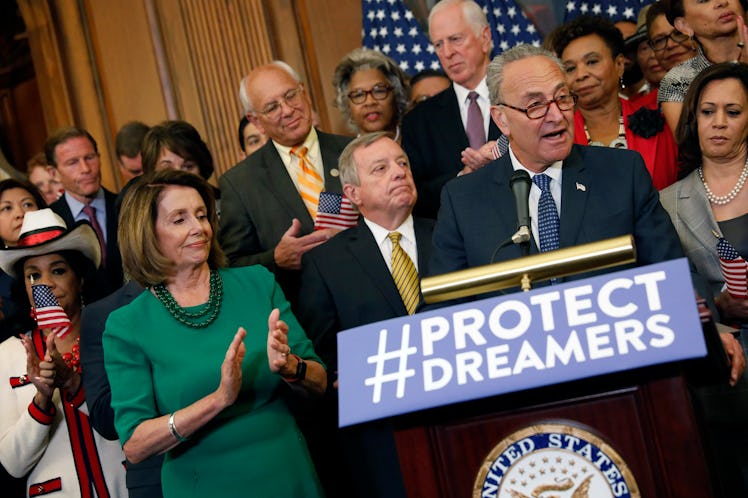
This Is Why DACA Is Key To Our Government Avoiding A Shutdown
For months, Democrats and Republicans in Congress have known what the month of December would bring: the possibility of a government shutdown. Now that it's here, another major political subject has returned to the forefront as well, the Deferred Action for Childhood Arrivals (DACA) policy. You might wonder then, what the connection is between the two — or, in other words, how is DACA related to a government shutdown?
The CliffsNotes Version
The basic, general answer is not too complicated.
Friday, Dec. 8, marks the deadline for the federal government (i.e. Congress and President Donald Trump) to agree on budget for the year, or there won't be any budget at all, hence the possibility of a "shutdown."
Agreeing on a budget requires Democratic input, however. That's because unlike the process that has been used to pass tax reform, passing a budget requires more than a simple majority. So, while negotiating, Democrats can demand a deal that includes commitment to permanent protections for DACA (Deferred Action for Childhood Arrivals) recipients, aka "Dreamers."
If Republicans and Democrats stand firm on either side of the issue and don't come to an overall agreement for a budget because of a stalemate, then there's your government shutdown.
"It could happen," Trump told reporters at the White House on Wednesday, Dec. 6. "Democrats are really looking at something that is very dangerous for our country. They are looking at shutting down. They want to have illegal immigrants in many cases, people that we don't want in our country, they want to have illegal immigrants pouring into our country."
The Elaborated Version
The irony of Trump teasing the possibility of a shutdown is that his own deal-making made this situation possible. To understand how (which would really explain why DACA may be key to avoiding a government shutdown) we have to back things up a bit, back to when Trump rescinded DACA in September.
At the time, the president didn't really end the program, at least not immediately. He set a timeline for the program to end around March 2018. And even then, he said he'd "revisit" the issue, hinting at the idea that he might never truly end DACA.
Then, a mere 10 days after his decision to "end" DACA, Trump handed Dreamers and Democrats a lifeline. He made a tentative agreement with Chuck Schumer and Nancy Pelosi, the two highest ranking Dems in Congress, that featured two big points.
First, the yearly budget (which was really supposed to be negotiated in September) would be given a three month extension, hence the December deadline. Second, Trump would approve a deal that sees Congress provide permanent protection to Dreamers, in exchange for more border security, but no funding for a border wall.
Since then, Trump and Republicans have given mixed signals about whether that type of deal will actually be honored. But the bottom line is that December is here, which means the deadline that the president agreed to is here, which in turn means that DACA becomes that much more important.
All things considered, though, a government shutdown seems unlikely.
"We don't think we're going to get to that," Schumer, the Democratic leader in the Senate, told reporters on Tuesday. "There are good negotiations occurring between Democrats and Republicans to come up with a good DACA program as well as some good border security."
Pelosi, the Democratic leader in the House, also downplayed the possibility. "President Trump is the only person talking about a government shutdown. Democrats are hopeful the President will be open to an agreement to address the urgent needs of the American people and keep government open," Pelosi tweeted."
All in all, a deal for Dreamers is an idea that both Trump and Democrats have shown at least some desire for. Whether that desire results in a deal during budget talks is the question now.